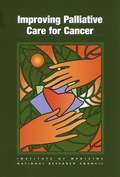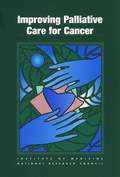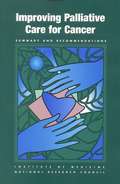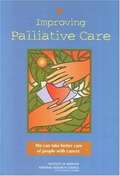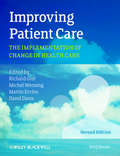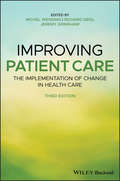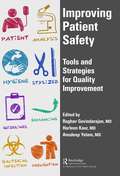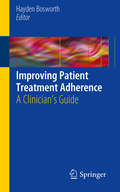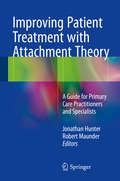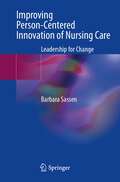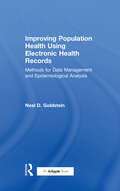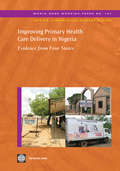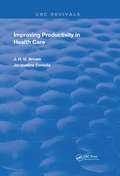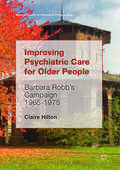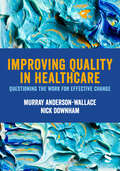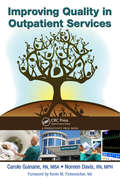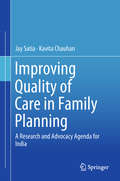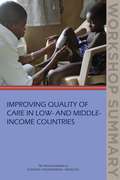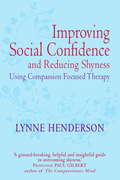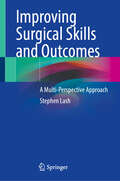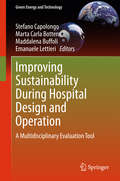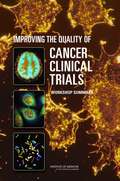- Table View
- List View
Improving Palliative Care for Cancer
by National Research Council Institute of MedicienIn our society’s aggressive pursuit of cures for cancer, we have neglected symptom control and comfort care. Less than one percent of the National Cancer Institute’s budget is spent on any aspect of palliative care research or education, despite the half million people who die of cancer each year and the larger number living with cancer and its symptoms. Improving Palliative Care for Cancer examines the barriers—scientific, policy, and social—that keep those in need from getting good palliative care. It goes on to recommend public- and private-sector actions that would lead to the development of more effective palliative interventions; better information about currently used interventions; and greater knowledge about, and access to, palliative care for all those with cancer who would benefit from it.
Improving Palliative Care for Cancer
by Institute of MedicineIn our society’s aggressive pursuit of cures for cancer, we have neglected symptom control and comfort care. Less than one percent of the National Cancer Institute’s budget is spent on any aspect of palliative care research or education, despite the half million people who die of cancer each year and the larger number living with cancer and its symptoms. Improving Palliative Care for Cancer examines the barriers—scientific, policy, and social—that keep those in need from getting good palliative care. It goes on to recommend public- and private-sector actions that would lead to the development of more effective palliative interventions; better information about currently used interventions; and greater knowledge about, and access to, palliative care for all those with cancer who would benefit from it.
Improving Palliative Care for Cancer: Summary and Recommendations
by National Research Council Institute of MedicienInformation on Improving Palliative Care for Cancer
Improving Palliative Care: We can take better care of people with cancer
by Institute Of Medicine National Research CouncilA report on Improving Palliative Care
Improving Patient Care
by David Davis Martin Eccles Richard Grol Michel WensingAs innovations are constantly being developed within health care, it can be difficult both to select appropriate new practices and technologies and to successfully adopt them within complex organizations. It is necessary to understand the consequences of introducing change, how to best implement new procedures and techniques, how to evaluate success and to improve the quality of patient care. This comprehensive guide allows you to do just that. Improving Patient Care, 2nd edition provides a structure for professionals and change agents to implement better practices in health care. It helps health professionals, managers, policy makers and researchers to assess new techniques and select and implement change in their organizations. This new edition includes recent evidence and further coverage on patient safety and patient centred strategies for change. Written by an international expert author team, Improving Patient Care is an established standard text for postgraduate students of health policy, health services and health management. The strong author team are global professors involved in managing research and development in the field of quality improvement, evidence-based practice and guidelines, quality assessment and indicators to improve patient outcomes through receiving appropriate healthcare.
Improving Patient Care: The Implementation of Change in Health Care
by Richard Grol Michel Wensing Jeremy GrimshawStrategies for successfully updating and improving health care organizations of all kinds Health care is always evolving and improving. However, the rapid speed of medical advancement can make the adoption of new technologies and practices a challenging process – particularly in large organizations and complex networks. Any projected impact upon quality and outcomes of care must be carefully evaluated so that changes may be implemented in the most efficacious and efficient manner possible. Improving Patient Care equips professionals and policymakers with the knowledge required to successfully optimize health care practice. By integrating scientific evidence and practical experience, the text presents a cohesive and proven model for practice change and innovation, complete with analysis of innovation, target group and setting; selection and application of strategies; and evaluation of process, outcomes and costs. This new third edition also includes: Newly written chapters on clinical performance feedback, patient engagement, patient safety, evaluation designs, and methods for process evaluation Increased emphasis on the role of contextual influences in implementation and improvement New research examples from across the world and updated scientific literature throughout Designed to help promote safer and more efficient, patient-centered care and better outcomes, Improving Patient Care is an essential resource for healthcare providers, quality assessors, and students of health services research, health management, and health policy.
Improving Patient Safety: Tools and Strategies for Quality Improvement
by Raghav GovindarajanBased on the IOM's estimate of 44,000 deaths annually, medical errors rank as the eighth leading cause of death in the U.S. Clearly medical errors are an epidemic that needs to be contained. Despite these numbers, patient safety and medical errors remain an issue for physicians and other clinicians. This book bridges the issues related to patient safety by providing clinically relevant, vignette-based description of the areas where most problems occur. Each vignette highlights a particular issue such as communication, human facturs, E.H.R., etc. and provides tools and strategies for improving quality in these areas and creating a safer environment for patients.
Improving Patient Treatment Adherence
by Hayden BosworthDespite its direct effect on a patient's health, the literature on treatment adherence does not yet include a summary of proven methods for identifying and addressing patient non-adherence. Improving Patient Treatment Adherence Across Multiple Behaviors: A Clinician's Guide differs significantly from many treatment adherence books on the market by focusing on clinicians and the practical tactics they need to improve patient adherence. The book is orgnaized by behavior and special issues as opposed to other texts, which look at treatment adherence as a theoretical concept. Each chapter provides a summary of existing literature regarding the impact of patient non-adherence, including costs, clinical outcomes and health-related quality of life, as well as a review of patient factors related to treatment adherence across behaviors, diseases, and special populations. A discussion of methods for improving treatment adherence takes a look at both proven methods and new technological advances in the field. Each chapter includes a table listing 3-5 key bullets that a clinician could use to address treatment adherence. Actual questions and scoring algorithms for widely used measures of treatment adherence make this book a useful guide for practicing clinicans.
Improving Patient Treatment with Attachment Theory
by Robert Maunder Jonathan HunterThis book emphasizes interpersonal relationships as a frequently overlooked, yet crucial element in today's healthcare system and describes the utility of attachment theory in understanding and managing patients with medical and surgical illness. Sections on the fundamentals of attachment theory, specific patient populations, attachment-based interventions, and future directions comprehensively reflect our current knowledge. The summarized research demonstrates the value of attachment theory in approaching such common issues as non-adherence, strain in the healthcare worker-patient relationship, and somatoform complaints, as well as in modelling maladaptive stress responses and subsequent illness vulnerability. The contributing authors are internationally recognized researchers and teachers who have sought to make this volume accessible to anyone interested in using the positive aspects of interpersonal relationships to maximum advantage in the practice of healthcare.
Improving Person-Centered Innovation of Nursing Care: Leadership for Change
by Barbara SassenThis English edition helps students and nursing professionals give each patient their unique position in healthcare delivery. The book provides tools to connect key topics and innovations in healthcare, developing a complete perspective on patient/person-centred care. It provides a comprehensive picture of important and recent insights on health and care. At its core, nurses provide care with a focus on the patient as a person. This person-centred care engages each patient's needs, preferences and expectations when providing integrated care.In this volume, care starts from the patient's point of view rather than from the role and function of the healthcare professional. The author relates themes such as relational care delivery, shared decision-making and empowerment to key concepts such as patient- and family-centred care, integrated care, patient-centred leadership(styles), quality of care and value-based healthcare.This book briefly and powerfully integrates these themes and describes them from a patient and client perspective, underpinned by the scientific literature on them. The themes are linked in a flowchart, starting from illness and working towards health, extending health even if people have a (physicalor mental) health problem. The purpose of this book is to offer a professional view of person-centred care. It stresses the importance of shared-decision making and leadership in promoting health in the care-setting. As such, it will be essential for any healthcare professional.
Improving Population Health Using Electronic Health Records: Methods for Data Management and Epidemiological Analysis
by Neal D. GoldsteinElectronic health records (EHRs) have become commonplace in the medical profession. Health data are readily captured and permanently stored in a digital fashion, and consequently, are increasingly being utilized in health research. The quality of this research depends upon the investigator’s ability to obtain the correct data to answer the correct question. It is easy to churn out poor quality research from the EHR; it is much harder to produce meaningful results that influence the population’s health. Improving Population Health Using Electronic Health Records takes the reader through the process of conducting meaningful research from data in the EHR. It de-mystifies the entire research process, from how to ask the right kind of research questions, to obtaining data with particular emphasis on data management and manipulation, to performing a valid statistical analyses, and interpreting and presenting the results in a clear, concise fashion that has the potential to improve population health. This book can be used as a hands-on how-to guide of performing research from EHR data in either a piece-meal fashion, selecting only the topics of greatest interest, or a complete guide to the entire research process. Readers will benefit from the intuitive presentation of complex methods with a multitude of examples. It is invaluable reading for researchers and clinicians who are not otherwise familiar with the complexities of working with large data sets.
Improving Primary Health Care Delivery in Nigeria
by World BankThis paper, based on quantitative surveys at the level of primary health care facilities, health care personnel, and households in their vicinity, aims at understanding the performance of primary health care providers in four states in Nigeria. As possible ways to improve performance, the paper concludes that clearly defining lines of responsibility, implementing performance-based financing of local governments and providers, and collecting, analyzing, and sharing information are some options that can help realign incentives and improve accountability in the service delivery chain and service provision. This working paper was produced as part of the World Bank's Africa Region Health Systems for Outcomes (HSO) Program. The Program, funded by the World Bank, the Government of Norway, the Government of the United Kingdom, and the Global Alliance for Vaccines and Immunization (GAVI), focuses on strengthening health systems in Africa to reach the poor and achieve tangible results related to Health, Nutrition, and Population. The main pillars and focus of the program center on knowledge and capacity building related to Human Resources for Health, Health Financing, Pharma-ceuticals, Governance and Service Delivery, and Infrastructure and ICT.
Improving Productivity In Health Care (Routledge Revivals)
by Jack H.U. Brown Jacqueline ComolaFirst Published in 1988, this book offers a full, comprehensive guide to improving and streamlining productivity in health care. Carefully compiled and filled with a vast repertoire of notes, diagrams, and references this book serves as a useful reference for students of medicine, student nurses, and other practitioners in their respective fields.
Improving Psychiatric Care for Older People
by Claire HiltonThis book is open access under a CC BY 4. 0 license. This book tells the story of Barbara Robb and her pressure group, Aid for the Elderly in Government Institutions (AEGIS). In 1965, Barbara visited 73-year-old Amy Gibbs in a dilapidated and overcrowded National Health Service psychiatric hospital back-ward. She was so appalled by the low standards that she set out to make improvements. Barbara's book Sans Everything: A case to answer was publicly discredited by a complacent and self-righteous Ministry of Health. However, inspired by her work, staff in other hospitals 'whistle-blew' about events they witnessed, which corroborated her allegations. Barbara influenced government policy, to improve psychiatric care and health service complaints procedures, and to establish a hospitals' inspectorate and ombudsman. The book will appeal to campaigners, health and social care staff and others working with older people, and those with an interest in policy development in England, the 1960s, women's history and the history of psychiatry and nursing.
Improving Quality in Healthcare: Questioning the Work for Effective Change
by Murray Anderson-Wallace Nick DownhamThis book is for anyone who is interested in improving quality in healthcare. It will appeal to those who are traditionally responsible for quality matters, as well as practicing clinicians and leaders. Unusually, it will also be as relevant to those who have the keenest interest in the quality of care - interested citizens. It is a deliberate antidote to the anti-intellectual, QI tool driven, mechanistic approach that still dominates much of healthcare quality improvement work. The authors - both of whom have extensive experience of working in and around quality issues in healthcare at a national, regional and local level - challenge such approaches, which they believe fail to take account of patient and organisational context and invite reductionism, cherry picking, atomisation of complex issues, leading ultimately to simplistic and unsustainable outcomes. Key features of the book: · An exploration of some of the often-overlooked and misunderstood core concepts of quality; their history and meaning in a contemporary context. · A framework to "question the work" using four interconnected conceptual domains as a valuable framework to consider improving quality and reducing failure demand. · Critical re-examination of the dominant approaches to change that are frequently adopted in "quality" work, many of which have been rooted in scientific management that have failed to live up to their promise – particularly transformational. · Exploring how an inter-disciplinary perspective can reframe aspects of quality thinking.
Improving Quality in Healthcare: Questioning the Work for Effective Change
by Murray Anderson-Wallace Nick DownhamThis book is for anyone who is interested in improving quality in healthcare. It will appeal to those who are traditionally responsible for quality matters, as well as practicing clinicians and leaders. Unusually, it will also be as relevant to those who have the keenest interest in the quality of care - interested citizens. It is a deliberate antidote to the anti-intellectual, QI tool driven, mechanistic approach that still dominates much of healthcare quality improvement work. The authors - both of whom have extensive experience of working in and around quality issues in healthcare at a national, regional and local level - challenge such approaches, which they believe fail to take account of patient and organisational context and invite reductionism, cherry picking, atomisation of complex issues, leading ultimately to simplistic and unsustainable outcomes. Key features of the book: · An exploration of some of the often-overlooked and misunderstood core concepts of quality; their history and meaning in a contemporary context. · A framework to "question the work" using four interconnected conceptual domains as a valuable framework to consider improving quality and reducing failure demand. · Critical re-examination of the dominant approaches to change that are frequently adopted in "quality" work, many of which have been rooted in scientific management that have failed to live up to their promise – particularly transformational. · Exploring how an inter-disciplinary perspective can reframe aspects of quality thinking.
Improving Quality in Outpatient Services
by Carole Guinane Noreen DavisA valuable reference for those involved in the field of ambulatory patient care, Improving Quality in Outpatient Services offers time-tested instruction on how to create a world-class outpatient program. It supplies a high-level overview of current opportunities, national quality programs, and challenges outlining the policies, procedures, and plan
Improving Quality of Care in Family Planning: A Research And Advocacy Agenda For India
by Jay Satia Kavita ChauhanIn this book the authors review initiatives in improving the quality of care for family planning in India and bring them to the broader forum of policy-level discussions. The global Family Planning 2020 (FP2020) framework argues for voluntary rights-based family planning programmes. The rights-based approach builds on the bedrock of quality of care, which means listening to what women want, treating individuals with dignity and respect and ensuring that everyone has access to full information and high quality care. Improving the quality of care in family planning services in a country like India is crucial from individual, national and global considerations. This book critically discusses and evaluates the various interventions undertaken so far and the reasons for success and failure. It also synthesizes current research studies in India, identifies gaps and presents a research agenda to bridge this gap and accelerate progress towards improving quality of care in family planning. It presents a comprehensive framework that underscores the importance of health systems and community environments in creating enabling, motivating and empowering roles for providers and clients. The examples and perspectives presented in this book make a strong case for adoption into policy frameworks and scaling up of quality of care efforts, and identifying research priorities for strengthening the response to family planning. This book greatly contributes towards enhancing the quality of family planning care at the grass-roots level in low resource settings and is of interest to researchers and practitioners of public health, particularly community health, maternal and child health, and social work.
Improving Quality of Care in Low- and Middle-Income Countries: Workshop Summary
by Gillian J. BuckleyQuality of care is a priority for U. S. Agency for International Development (USAID). The agency's missions abroad and their host country partners work in quality improvement, but a lack of evidence about the best ways to facilitate such improvements has constrained their informed selection of interventions. Six different methods - accreditation, COPE, improvement collaborative, standards-based management and recognitions (SBM-R), supervision, and clinical in-service training - currently make up the majority of this investment for USAID missions. As their already substantial investment in quality grows, there is demand for more scientific evidence on how to reliably improve quality of care in poor countries. USAID missions, and many other organizations spending on quality improvement, would welcome more information about how different strategies work to improve quality, when and where certain tools are most effective, and the best ways to measure success and shortcomings. To gain a better understanding of the evidence supporting different quality improvement tools and clarity on how they would help advance the global quality improvement agenda, the Institute of Medicine convened a 2-day workshop in January 2015. The workshop's goal was to illuminate these different methods, discussing their pros and cons. This workshop summary is a description of the presentations and discussions.
Improving Social Confidence and Reducing Shyness Using Compassion Focused Therapy: Series editor, Paul Gilbert
by Lynne HendersonShyness can affect most of us to varying degrees, and tends to affect children more than adults as people tend to grow in confidence as they get older. It is therefore a universal emotion but in some people it is a more pronounced personality trait. Severe shyness is referred to as 'social anxiety disorder', however this self-help book is written for the people experiencing different degrees of shyness. Shyness has evolved as an emotion over thousands of years and can be helpful in some circumstances, however normal shyness can become chronic thanks to negative thoughts, avoidance and withdrawal. While shyness has its functions, it becomes a problem when it interferes with life goals, develops into social anxiety disorder or leads on to 'learned pessimism', mild depression and even 'learned helplessness'. This self-help book, based on the groundbreaking new Compassion Focused Therapy, sets out the background to shyness - its evolutionary functions, why it becomes chronic in some people, and sets out skills and exercises based on CFT to help the reader overcome problematic shyness.
Improving Social Confidence and Reducing Shyness Using Compassion Focused Therapy: Series editor, Paul Gilbert
by Lynne HendersonShyness can affect most of us to varying degrees, and tends to affect children more than adults as people tend to grow in confidence as they get older. It is therefore a universal emotion but in some people it is a more pronounced personality trait. Severe shyness is referred to as 'social anxiety disorder', however this self-help book is written for the people experiencing different degrees of shyness. Shyness has evolved as an emotion over thousands of years and can be helpful in some circumstances, however normal shyness can become chronic thanks to negative thoughts, avoidance and withdrawal. While shyness has its functions, it becomes a problem when it interferes with life goals, develops into social anxiety disorder or leads on to 'learned pessimism', mild depression and even 'learned helplessness'. This self-help book, based on the groundbreaking new Compassion Focused Therapy, sets out the background to shyness - its evolutionary functions, why it becomes chronic in some people, and sets out skills and exercises based on CFT to help the reader overcome problematic shyness.
Improving Surgical Skills and Outcomes: A Multi-Perspective Approach
by Stephen LashDrawing on 25 years of experience, Consultant surgeon Mr Stephen Lash offers a fresh approach to the practice of surgery. His three perspectives or ‘Boxes’ explore the ‘How’ the ‘What’ and the ‘Why’ of surgery drawing lessons from Elite athletes to Toyota and from pilots to personality. Each box contributes a novel perspective to the surgeon’s learning and practice and offers practical tips to apply in theatre. It is easy to read and designed to be used alongside training and stimulate interesting conversations during the surgical debrief, best served with coffee. “There are endless books about surgical technique, but a woeful lack of information on how to be a surgeon. This book helps fill that gap.” Prof Andrew Luff MA, MBBS, FRCS, FRCOphth Consultant Ophthalmic Surgeon “I am convinced that it will not only appeal to the surgeons for which it was written but to a wider public as well. After all what is an operating theatre if not an open window on the real world?” Giampaolo Gini MD PhD President of the European Vitreo-Retinal Society This book is an ideal companion to surgeons everywhere from Dentists on the high street to Consultants in specialist units, medical students to key opinion leaders and anyone interested in this particular type of person willing to cut into another in pursuit of wholeness.
Improving Sustainability During Hospital Design and Operation
by Stefano Capolongo Marta Carla Bottero Maddalena Buffoli Emanuele LettieriThis book describes the Sustainable High Quality Healthcare (SustHealth) project, which had the goal of developing an original multidisciplinary evaluation tool that can be applied to assess and improve hospitals' overall sustainability. The comprehensive nature of the appraisal offered by this tool exceeds the scope of most current rating systems, which typically permit a thorough evaluation of relevant environmental factors when designing a new building but fail to consider social and economic impacts of the design phase or the performance of the hospital's operational structure in these fields. The multidisciplinary evaluation system was developed, from its very inception through to its testing, by following a scientific experimental method in which a global perspective was constantly maintained, as opposed to a focus only on specific technical issues. Application of the SustHealth rating tool to a currently functioning hospital, or one under design, will identify weaknesses and guide users to potential low-cost short-term solutions and longer-term strategies for improvement.
Improving The Quality Of Cancer Clinical Trials: Workshop Summary
by Institute of Medicine of the National AcademiesScientists and clinicians seek a new paradigm that could improve the efficiency, cost-effectiveness, and overall success rate of cancer clinical trials, while maintaining the highest standards of quality. To explore innovative paradigms for cancer clinical trials and other ways to improve their quality, the National Cancer Policy Forum held a workshop, Improving the Quality of Cancer Clinical Trials, in Washington, DC. The main goals of the workshop were to examine new approaches to clinical trial design and execution that would: (1) better inform decisions and plans of those responsible for developing new cancer therapies (2) more rapidly move new diagnostic tests and treatments toward regulatory approval and use in the clinic (3) be less costly than current trials The resulting workshop summary will serve as input to the deliberations of an Institute of Medicine committee that will develop consensus-based recommendations for moving the field of cancer clinical trials forward.
Improving Upper Body Control: An Approach To Assessment And Treatment Of Tonal Dysfunction
by Regi BoehmeImproving Upper Body Control: An Approach to Assessment and Treatment of Tonal Dysfunction
